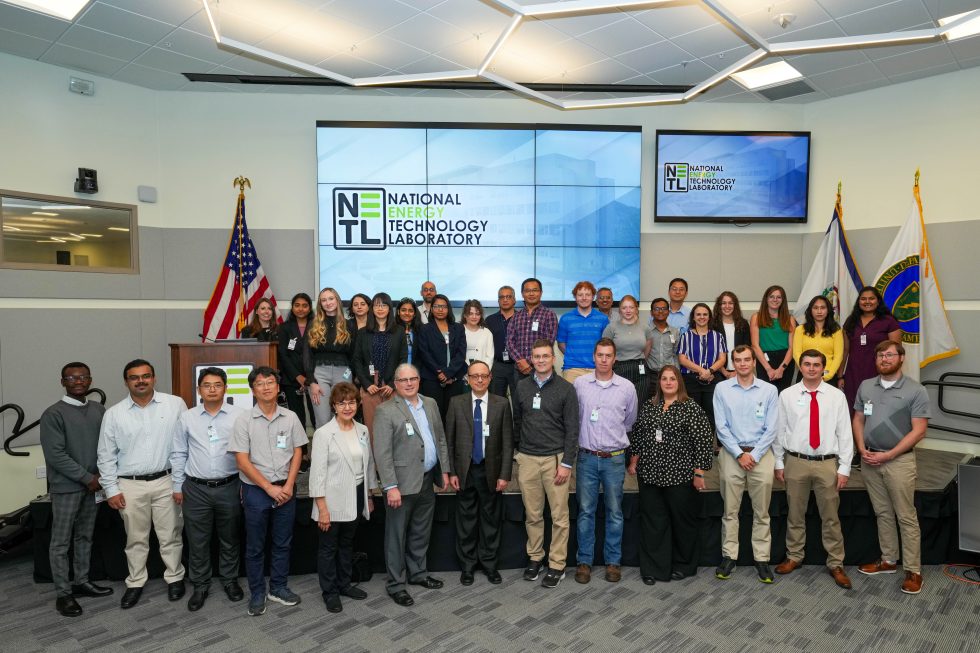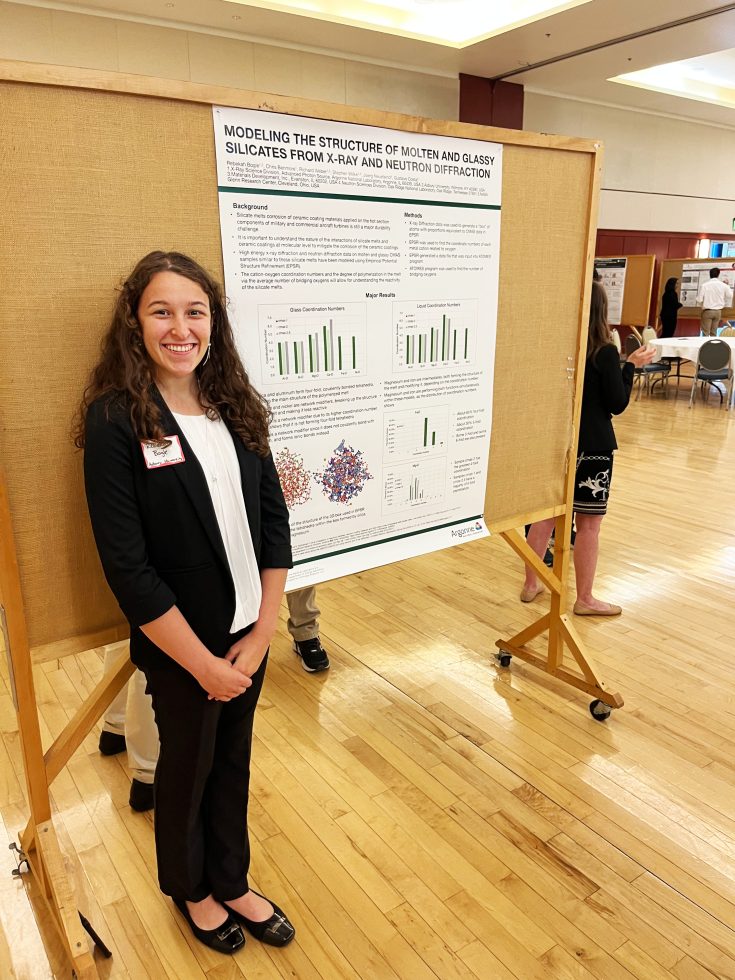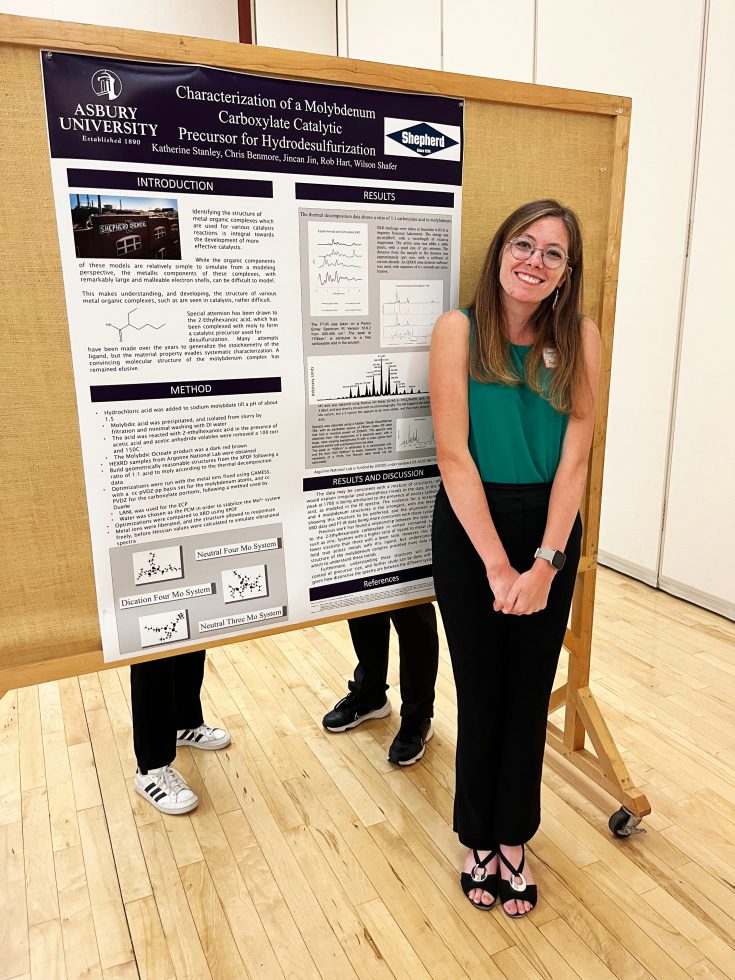Asbury Chemistry Students Present Research at Science Conference
September 18, 2023

Assistant Professor of Chemistry Dr. Wilson Shafer, Rebekah Bogle ’24, and Katherine Stanley ’24 attended the Tri-State Catalysis Society’s meeting where Stanley and Bogle presented their research posters. The Tri-State Catalysis Society exists to promote and encourage the growth and development of the science of catalysis and related fields. Learn more: https://www.tristatecatalysis.org/about.
“In science, questions are just as important as answers,” Shafer said. “Rebekah and Katherine ask solid questions, and they are ready to move into Ph.D. programs.”

Bogle conducted summer research using NASA samples at Argonne National Lab and Oak Ridge National Lab. After graduation, Bogle plans to earn her Ph.D. in analytical chemistry.
“My research focused on using Empirical Potential Structure Refinement (EPSR) to model some Calcium-Magnesium-Aluminosilicate (CMAS) samples to help gather data on the reactivity of silicate melts,” Bogle said. “The reason we want to know about the reactivity of silicate melts is because they cause corrosion on ceramic coatings in military and commercial aircraft turbines, which is a major durability challenge.”
Assistant Professor of Chemistry Dr. Laura Walther ’91 shares about having Bogle as a student.
“I first had Rebekah in my 300-level chemistry class when she was a first-semester freshman,” Walther said. “She really has a gift for teaching, but her true passion lies in research. She worked for me in the chemistry prep lab, as a teaching assistant in my lab classes, and as a chemistry tutor. She is an excellent student who will go far.”

Stanley conducted summer research with Dr. Shafer to identify a catalyst structure for Shepherd Chemicals in Cincinnati. In the future, Stanley plans to attend graduate school to pursue physical chemistry.
“We worked to identify the structure of a molybdenum precursor that is sold by Shepherd Chemicals, using different computational methods,” Stanley said.
Shafer shares about having Stanley as a student.
“Katherine has been enthusiastic about this research,” he said. “She is independent and has been able to pick up the work and drive it herself. This is not common for undergraduates; this is more common for upper-level graduate students. It has been a blast seeing her go from being interested in the work to driving it herself and the unique ways she has gotten there.”
Bogle and Stanley express gratitude to professors in the Shaw School of Sciences.
“Dr. Walther has greatly influenced my career trajectory; it is thanks to her that I have decided to do analytical chemistry as my specialty in grad school,” Bogle said. “Dr. Shafer has provided many opportunities for me to do research as an undergraduate and work on instruments. They have both been amazing mentors.”
“If I had been at a larger school, I doubt I would have had the ability to work on projects like this so easily, so I am grateful to Dr. Shafer for that opportunity,” Stanley said. “I also learned a lot from Dr. Bruce Branan in organic chemistry. I have had a very good experience with Asbury’s chemistry department.”
Shafer encourages prospective students to consider majoring in Chemistry.
“Beyond the medicinal routes and teaching, you could work in law, research, business, government, policy, environmental science, quality control, forensics, and more,” he said. “You could even start your own company like Dr. Walt Shaw ’63.”
The Shaw School of Sciences offers fourteen majors and six minors, including biology, chemistry, and physics: https://www.asbury.edu/about/offices/schools/science-health-math/. The Shaw Collaborative Learning Center offers eleven laboratories, with spaces dedicated to eDNA research, cell and molecular biochemistry, ecology and environmental science, physics, organic chemistry, inorganic chemistry, instrumentation, biology preparation, chemistry preparation, and collaborative innovation.